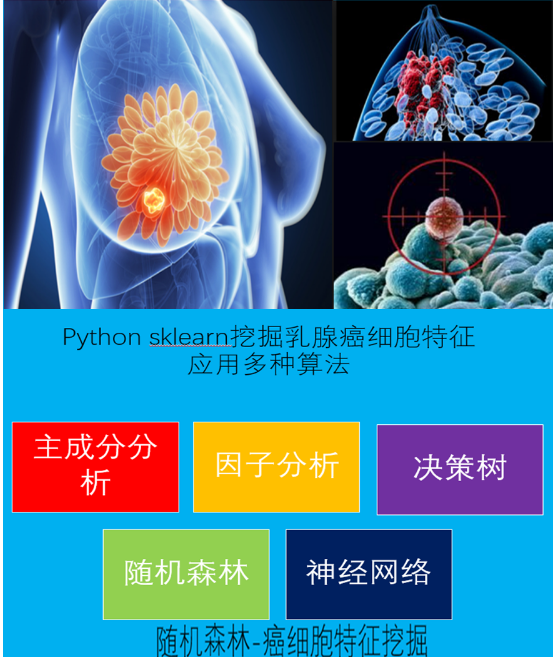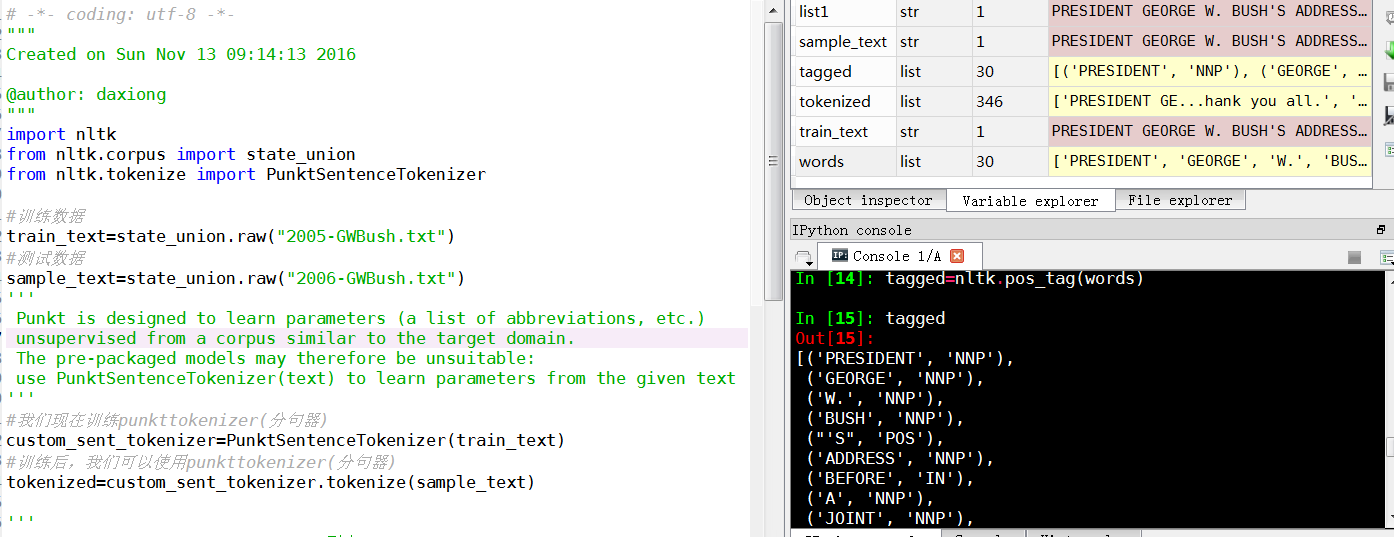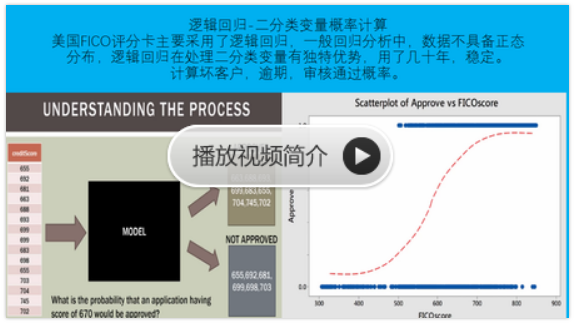自然语言15_Part of Speech Tagging with NLTK
sklearn实战-乳腺癌细胞数据挖掘(博主亲自录制视频教程)
https://study.163.com/course/introduction.htm?courseId=1005269003&utm_campaign=commission&utm_source=cp-400000000398149&utm_medium=share

https://www.pythonprogramming.net/part-of-speech-tagging-nltk-tutorial/?completed=/stemming-nltk-tutorial/
# -*- coding: utf-8 -*-
"""
Created on Sun Nov 13 09:14:13 2016 @author: daxiong
"""
import nltk
from nltk.corpus import state_union
from nltk.tokenize import PunktSentenceTokenizer #训练数据
train_text=state_union.raw("2005-GWBush.txt")
#测试数据
sample_text=state_union.raw("2006-GWBush.txt")
'''
Punkt is designed to learn parameters (a list of abbreviations, etc.)
unsupervised from a corpus similar to the target domain.
The pre-packaged models may therefore be unsuitable:
use PunktSentenceTokenizer(text) to learn parameters from the given text
'''
#我们现在训练punkttokenizer(分句器)
custom_sent_tokenizer=PunktSentenceTokenizer(train_text)
#训练后,我们可以使用punkttokenizer(分句器)
tokenized=custom_sent_tokenizer.tokenize(sample_text) '''
nltk.pos_tag(["fire"]) #pos_tag(列表)
Out[19]: [('fire', 'NN')]
''' #文本词性标记函数
def process_content():
try:
for i in tokenized[0:5]:
words=nltk.word_tokenize(i)
tagged=nltk.pos_tag(words)
print(tagged)
except Exception as e:
print(str(e)) process_content()

One of the more powerful aspects of the NLTK module is the Part of Speech tagging that it can do for you. This means labeling words in a sentence as nouns, adjectives, verbs...etc. Even more impressive, it also labels by tense, and more. Here's a list of the tags, what they mean, and some examples:
POS tag list: CC coordinating conjunction
CD cardinal digit
DT determiner
EX existential there (like: "there is" ... think of it like "there exists")
FW foreign word
IN preposition/subordinating conjunction
JJ adjective 'big'
JJR adjective, comparative 'bigger'
JJS adjective, superlative 'biggest'
LS list marker 1)
MD modal could, will
NN noun, singular 'desk'
NNS noun plural 'desks'
NNP proper noun, singular 'Harrison'
NNPS proper noun, plural 'Americans'
PDT predeterminer 'all the kids'
POS possessive ending parent's
PRP personal pronoun I, he, she
PRP$ possessive pronoun my, his, hers
RB adverb very, silently,
RBR adverb, comparative better
RBS adverb, superlative best
RP particle give up
TO to go 'to' the store.
UH interjection errrrrrrrm
VB verb, base form take
VBD verb, past tense took
VBG verb, gerund/present participle taking
VBN verb, past participle taken
VBP verb, sing. present, non-3d take
VBZ verb, 3rd person sing. present takes
WDT wh-determiner which
WP wh-pronoun who, what
WP$ possessive wh-pronoun whose
WRB wh-abverb where, when
How might we use this? While we're at it, we're going to cover a new sentence tokenizer, called the PunktSentenceTokenizer. This tokenizer is capable of unsupervised machine learning, so you can actually train it on any body of text that you use. First, let's get some imports out of the way that we're going to use:
import nltk
from nltk.corpus import state_union
from nltk.tokenize import PunktSentenceTokenizer
Now, let's create our training and testing data:
train_text = state_union.raw("2005-GWBush.txt")
sample_text = state_union.raw("2006-GWBush.txt")
One is a State of the Union address from 2005, and the other is from 2006 from past President George W. Bush.
Next, we can train the Punkt tokenizer like:
custom_sent_tokenizer = PunktSentenceTokenizer(train_text)
Then we can actually tokenize, using:
tokenized = custom_sent_tokenizer.tokenize(sample_text)
Now we can finish up this part of speech tagging script by creating a function that will run through and tag all of the parts of speech per sentence like so:
def process_content():
try:
for i in tokenized[:5]:
words = nltk.word_tokenize(i)
tagged = nltk.pos_tag(words)
print(tagged) except Exception as e:
print(str(e)) process_content()
The output should be a list of tuples, where the first element in the tuple is the word, and the second is the part of speech tag. It should look like:
[('PRESIDENT', 'NNP'), ('GEORGE', 'NNP'), ('W.', 'NNP'), ('BUSH', 'NNP'), ("'S", 'POS'), ('ADDRESS', 'NNP'), ('BEFORE', 'NNP'), ('A', 'NNP'), ('JOINT', 'NNP'), ('SESSION', 'NNP'), ('OF', 'NNP'), ('THE', 'NNP'), ('CONGRESS', 'NNP'), ('ON', 'NNP'), ('THE', 'NNP'), ('STATE', 'NNP'), ('OF', 'NNP'), ('THE', 'NNP'), ('UNION', 'NNP'), ('January', 'NNP'), ('31', 'CD'), (',', ','), ('2006', 'CD'), ('THE', 'DT'), ('PRESIDENT', 'NNP'), (':', ':'), ('Thank', 'NNP'), ('you', 'PRP'), ('all', 'DT'), ('.', '.')] [('Mr.', 'NNP'), ('Speaker', 'NNP'), (',', ','), ('Vice', 'NNP'), ('President', 'NNP'), ('Cheney', 'NNP'), (',', ','), ('members', 'NNS'), ('of', 'IN'), ('Congress', 'NNP'), (',', ','), ('members', 'NNS'), ('of', 'IN'), ('the', 'DT'), ('Supreme', 'NNP'), ('Court', 'NNP'), ('and', 'CC'), ('diplomatic', 'JJ'), ('corps', 'NNS'), (',', ','), ('distinguished', 'VBD'), ('guests', 'NNS'), (',', ','), ('and', 'CC'), ('fellow', 'JJ'), ('citizens', 'NNS'), (':', ':'), ('Today', 'NN'), ('our', 'PRP$'), ('nation', 'NN'), ('lost', 'VBD'), ('a', 'DT'), ('beloved', 'VBN'), (',', ','), ('graceful', 'JJ'), (',', ','), ('courageous', 'JJ'), ('woman', 'NN'), ('who', 'WP'), ('called', 'VBN'), ('America', 'NNP'), ('to', 'TO'), ('its', 'PRP$'), ('founding', 'NN'), ('ideals', 'NNS'), ('and', 'CC'), ('carried', 'VBD'), ('on', 'IN'), ('a', 'DT'), ('noble', 'JJ'), ('dream', 'NN'), ('.', '.')] [('Tonight', 'NNP'), ('we', 'PRP'), ('are', 'VBP'), ('comforted', 'VBN'), ('by', 'IN'), ('the', 'DT'), ('hope', 'NN'), ('of', 'IN'), ('a', 'DT'), ('glad', 'NN'), ('reunion', 'NN'), ('with', 'IN'), ('the', 'DT'), ('husband', 'NN'), ('who', 'WP'), ('was', 'VBD'), ('taken', 'VBN'), ('so', 'RB'), ('long', 'RB'), ('ago', 'RB'), (',', ','), ('and', 'CC'), ('we', 'PRP'), ('are', 'VBP'), ('grateful', 'JJ'), ('for', 'IN'), ('the', 'DT'), ('good', 'NN'), ('life', 'NN'), ('of', 'IN'), ('Coretta', 'NNP'), ('Scott', 'NNP'), ('King', 'NNP'), ('.', '.')] [('(', 'NN'), ('Applause', 'NNP'), ('.', '.'), (')', ':')] [('President', 'NNP'), ('George', 'NNP'), ('W.', 'NNP'), ('Bush', 'NNP'), ('reacts', 'VBZ'), ('to', 'TO'), ('applause', 'VB'), ('during', 'IN'), ('his', 'PRP$'), ('State', 'NNP'), ('of', 'IN'), ('the', 'DT'), ('Union', 'NNP'), ('Address', 'NNP'), ('at', 'IN'), ('the', 'DT'), ('Capitol', 'NNP'), (',', ','), ('Tuesday', 'NNP'), (',', ','), ('Jan', 'NNP'), ('.', '.')]
At this point, we can begin to derive meaning, but there is still some work to do. The next topic that we're going to cover is chunking, which is where we group words, based on their parts of speech, into hopefully meaningful groups.
自然语言15_Part of Speech Tagging with NLTK的更多相关文章
- 自然语言15.1_Part of Speech Tagging 词性标注
QQ:231469242 欢迎喜欢nltk朋友交流 https://en.wikipedia.org/wiki/Part-of-speech_tagging In corpus linguistics ...
- 自然语言12_Tokenizing Words and Sentences with NLTK
https://www.pythonprogramming.net/tokenizing-words-sentences-nltk-tutorial/ # -*- coding: utf-8 -*- ...
- 词性标注 parts of speech tagging
In corpus linguistics, part-of-speech tagging (POS tagging or POST), also called grammatical tagging ...
- 自然语言处理NLP程序包(NLTK/spaCy)使用总结
NLTK和SpaCy是NLP的Python应用,提供了一些现成的处理工具和数据接口.下面介绍它们的一些常用功能和特性,便于对NLP研究的组成形式有一个基本的了解. NLTK Natural Langu ...
- 自然语言27_Converting words to Features with NLTK
https://www.pythonprogramming.net/words-as-features-nltk-tutorial/ Converting words to Features with ...
- 自然语言18.1_Named Entity Recognition with NLTK
QQ:231469242 欢迎nltk爱好者交流 https://www.pythonprogramming.net/named-entity-recognition-nltk-tutorial/?c ...
- Part of Speech Tagging
Natural Language Processing with Python Charpter 6.1 suffix_fdist处代码稍微改动. import nltk from nltk.corp ...
- 自然语言14_Stemming words with NLTK
https://www.pythonprogramming.net/stemming-nltk-tutorial/?completed=/stop-words-nltk-tutorial/ # -*- ...
- python and 我爱自然语言处理
曾经因为NLTK的 缘故开始学习Python,之后渐渐成为我工作中的第一辅助脚本语言,虽然开发语言是C/C++,但平时的很多文本数据处理任务都交给了Python.离 开腾讯创业后,第一个作品课程图谱也 ...
随机推荐
- webpack入坑之旅(一)不是开始的开始
最近学习框架,选择了vue,然后接触到了vue中的单文件组件,官方推荐使用 Webpack + vue-loader构建这些单文件 Vue 组件,于是就开始了webpack的入坑之旅.因为原来没有用过 ...
- rabbitmq技术
Rabbitmq 初识rabbitmq RabbitMQ是流行的开源消息队列系统,用erlang语言开发.RabbitMQ是AMQP(高级消息队列协议)的标准实现.如果不熟悉AMQP,直接看Rabbi ...
- Android复习笔记--Intent
Intent是Android中各组件跳转的重要方式,一般可悲用于启动活动.启动服务.以及发送广播等场景. #显示Intent 主要主要用于启动已知的组件 //发送方 Intent intent = ...
- 【BZOJ 1503】【NOI 2004】郁闷的出纳员
$Splay$模板题. 复习一下伸展树的模板. 一定不要忘了push啊!!! 对于减工资后删掉员工的操作,我选择插入一个$min+delta_{减少的工资}$的节点,把它$Splay$到根,砍掉它自己 ...
- 网络流HDU 2883
建图 源点 -> 每个人 -> 每段时间 -> 汇点 时间要离散化一下 分成一些时间段 权 ...
- Java-URL类详解
类 URL 代表一个统一资源定位符,它是指向互联网“资源”的指针.资源可以是简单的文件或目录,也可以是对更为复杂的对象的引用,例如对数据库或搜索引擎的查询. URL(String spec) 根据 S ...
- maven中snapshot快照库和release发布库的区别和作用
在使用maven过程中,我们在开发阶段经常性的会有很多公共库处于不稳定状态,随时需要修改并发布,可能一天就要发布一次,遇到bug时,甚至一天要发布N次.我们知道,maven的依赖管理是基于版本管理的, ...
- 查看mysql语句运行时间
show profiles 之类的语句来查看 mysql> show profiles; Empty set mysql> show variables like "%pro%& ...
- 用 phylomatic 软件生成的进化树
用 phylomatic 软件生成的进化树 Phylomatic是在线软件,可以利用植物名录,按照APGIII的被子植物科的拓扑结构,生成进化树. 参考 张金龙博士 工作目录 setwd(" ...
- bzoj 1257
商最多有sqrt(n)个. #include<iostream> #include<cstdio> #include<cstring> #include<al ...

